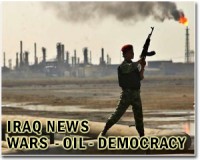 |
London (AFP) Oct 22, 2010 Suicide bombings, torture and military firefights -- for all the fragmentation and redaction in some 400,000 US military documents released by WikiLeaks Friday, a grim snapshot emerges of the Iraq war. Peppered with acronyms and gaps where names and personal information would normally appear, the documents seen by AFP in London ahead of their release are sometimes virtually impossible to understand. But occasionally, particularly vivid phrases and allegations jump out. Many of the secret documents -- which relate to the period after the 2003 US-led invasion which toppled Saddam Hussein -- chronicle claims of abuse by Iraqi security forces as recently as last year. One Iraqi detainee claimed he was "blindfolded and beaten with a wire by Iraqi Police on two consecutive nights", near Ramadi in 2008. Another detainee alleged that after being arrested at his home last year and transferred to a military HQ, "his hands were bound behind his back, (he) was placed in a stress position... and the bottoms of his feet were beaten with an object." The documents also mention an Al-Qaeda threat to behead female Western journalists working in Iraq in 2005. "An unknown number of female Western journalists currently staying at the hotel in ___, Baghdad (___) are targeted for beheading," one file says. "The Western female journalists wear___clothing and are reportedly under surveillance," it adds, with the dashes denoting redacted words. Other documents seen by AFP relate to military battles, notably the fighting in Fallujah in 2004, some of the fiercest in the war when thousands of US troops recaptured a city held by insurgents. "Commanding officer reports the battalions attack along kilo___front has met heavy enemy resistance...," one says. "They confirm a total of (___) enemy killed in action for the day." WikiLeaks invited a handful of journalists from international news organisations to a London venue for a three-and-a-half-hour lock-in preview of the documents just before their publication by a small group of newspapers. The documents were searchable by keyword -- although many of the obvious search terms, such as country names, had been redacted from the documents. Soon after the embargo on the files was lifted, the search facility for the documents crashed due to "too many requests". WikiLeaks' release of the documents has generated huge media interest but has been condemned by US Secretary of State Hillary Clinton and NATO Secretary General Anders Fogh Rasmussen. Clinton said she opposed "in the most clear terms" the leaking of any documents putting Americans at risk.
Share This Article With Planet Earth
Related Links Iraq: The first technology war of the 21st century
 Britain releases secret papers confirming Kelly suicide
Britain releases secret papers confirming Kelly suicideLondon (AFP) Oct 22, 2010 The British government released secret medical documents Friday confirming that Iraq weapons inspector David Kelly committed suicide by slashing his wrist after doubts were raised over the cause of death. The Ministry of Justice said it was publishing the papers - which had been classified for 70 years following an official inquiry into his death - "in the interests of maintaining public c ... read more |
|
| The content herein, unless otherwise known to be public domain, are Copyright 1995-2010 - SpaceDaily. AFP and UPI Wire Stories are copyright Agence France-Presse and United Press International. ESA Portal Reports are copyright European Space Agency. All NASA sourced material is public domain. Additional copyrights may apply in whole or part to other bona fide parties. Advertising does not imply endorsement,agreement or approval of any opinions, statements or information provided by SpaceDaily on any Web page published or hosted by SpaceDaily. Privacy Statement |